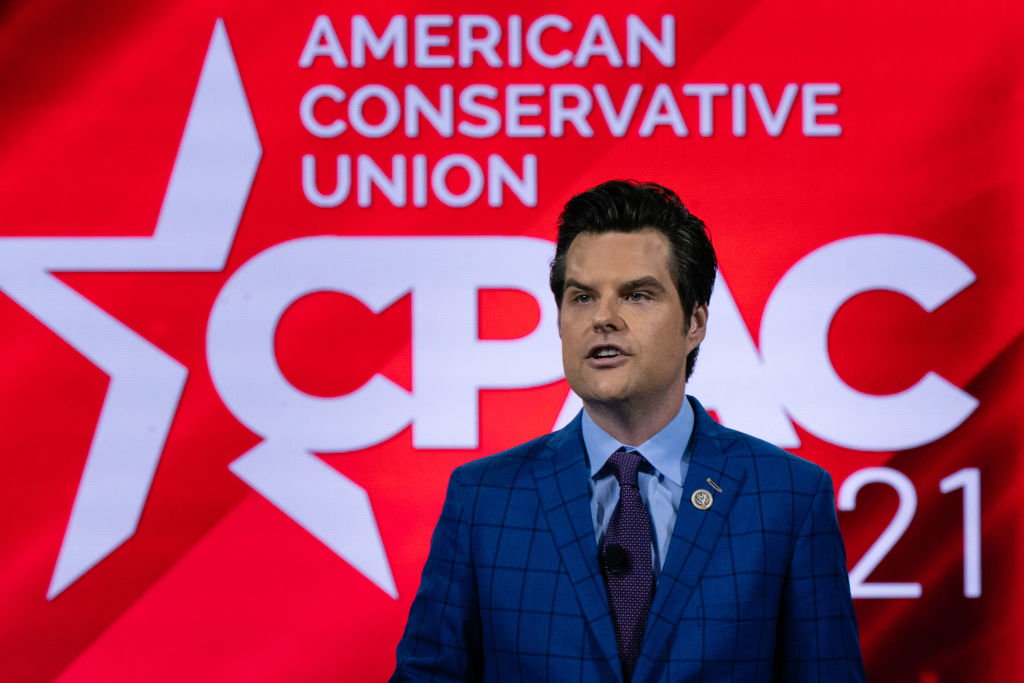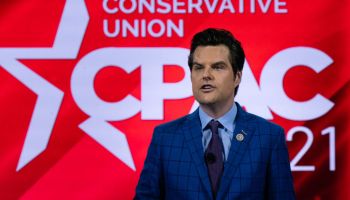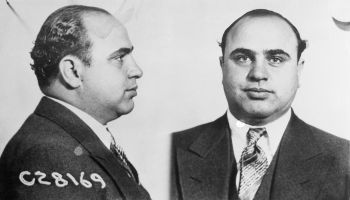
Source: Bloomberg / Getty
As if the allegations about a Trump-sympathizing Republican Congressman from Florida about trafficking at least one underage girl weren’t bad enough, a new report says he also used drugs and paid women for sex.
Rep. Matt Gaetz‘s reported use of ecstacy while paying women for sex runs counter to everything the MAGA man purportedly stands. It also added an extra criminal element to the existing federal investigations into Gaetz and one of his acquaintances accused of similar and worse behavior, including a 17-year-old girl who they both allegedly had sex with, the New York Times reported Thursday. Other men linked to Gaetz and his associate, Joel Greenberg, are being investigated by the Department of Justice for the same suspicions.
Gaetz has denied all allegations, but there are apparently receipts — literally.
The New York Times “reviewed receipts from Cash App, a mobile payments app, and Apple Pay that show payments from Mr. Gaetz and Mr. Greenberg to one of the women, and a payment from Mr. Greenberg to a second woman. The women told their friends that the payments were for sex with the two men, according to two people familiar with the conversations.”
Gaetz’s critics point to the figurative writing on the wall for reasons to doubt he’s being truthful. Like the time Gaetz was the only person in the House to vote against a bill combatting human trafficking. While there was widespread outrage at the way he voted against the anti-human trafficking bill in 2017, it hits a little different four years later as Gaetz is being investigated for that very crime.
“Unless there is an overwhelming, compelling reason that our existing agencies in the federal government can’t handle that problem, I vote no because voters in Northwest Florida did not send me to Washington to go and create more federal government,” Gaetz said following his vote. “If anything, we should be abolishing a lot of the agencies at the federal level like the Department of Education, like the EPA and sending that power back to our state governments.”
The element of Gaetz reportedly using illegal drugs was ironic, at best, considering he tried to publicly shame Hunter Biden during a House Judiciary Hearing as part of Trump’s first impeachment inquiry in 2019. At the time, Joe Biden and his son were accused of trying to influence Ukraine’s foreign policy during Barack Obama‘s administration and when Hunter joined the board of the Ukrainian gas company Burisma Holdings.
A New Yorker article covered an incident in which Hunter was in a crash while driving a rental car. According to the article, the Hertz rental officer on the scene said he discovered a crack pipe in the vehicle and white powder residue.
“I don’t want to make light of anybody’s substance abuse issues,” Gaetz unconvincingly said. “But it’s a little hard to believe that Burisma hired Hunter Biden to resolve their international disputes when he could not resolve his own dispute with Hertz rental car over leaving cocaine and a crack pipe in the car.”
That prompted Georgia Rep. Hank Johnson to publicly remind anybody listening that Gaetz also previously caught a DUI back in 2008.
“The pot calling the kettle black is not something that we should do. I don’t know what members, if any, have had any problems with substance abuse, been busted in DUI,” Johnson said responding to Gaetz. “I don’t know. But if I did, I wouldn’t raise it against anyone…. I don’t think it’s proper.”
Lest we forget that just about a year ago, at the onset of the pandemic, Gaetz complained that an HBCU was getting a small fraction of last year’s $2 trillion stimulus package.
“$13,000,000 in taxpayer funds could be going to families across the nation struggling to put food on the table in the midst of COVID-19,” Gaetz tweeted on March 25, 2020, in apparent resentment. “Instead, it’s going to Howard University.” Gaetz posted a photo of the passage in the legislation’s language and circled it in red ink as if to sound some type of alarm.
“Education is important- but a $13 million check to Howard does not belong in COVID-19 relief,” he ended his misguided Twitter rant with.
That’s just one example of how Gaetz is constantly talking out of his mouth without any context or tact to a particular topic and dripping with racist overtones.
SEE ALSO:
Kamala Harris Checks MAGA Congressman Angry About Coronavirus Stimulus Money For Her HBCU
Let’s Reflect On When Matt Gaetz Was Called Out For His DUI By Hank Johnson
- South Sudan: Entertainment, Food, Languages, Places To Visit + More
- Egypt: Entertainment, Food, Languages, Places To Visit + More
- Morocco: Entertainment, Food, Languages, Places To Visit + More
- Libya: Entertainment, Food, Languages, Places To Visit + More
- Tunisia: Entertainment, Food, Languages, Places To Visit + More
Florida Man Matt Gaetz Reportedly Took Ecstacy And Cash-Apped Women To Have Sex With Him was originally published on newsone.com















